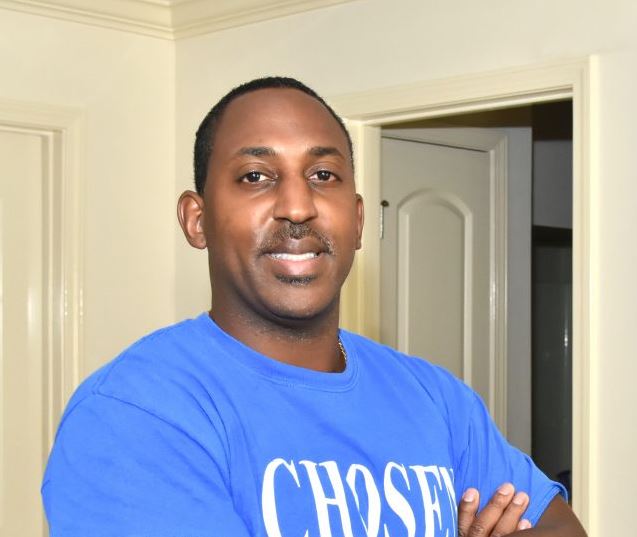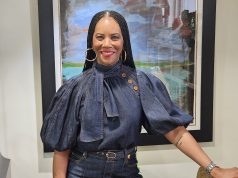Solomon Crenshaw Jr.
For the Birmingham Times
Jegil Dugger went from running a football at Midfield High School and the University of Alabama at Birmingham (UAB) to running a pair of tech companies. The former UAB Blazer’s path included a “business trip” that was anything but—except it helped put him where he is today.
“I finally found something that made me feel like I was on the football field,” the 40-year-old resident of Hoover, Alabama’s, Ross Bridge community said. “I didn’t get it when I was coaching. I finally found it in entrepreneurship.”
Dugger’s companies are an extension of his work and his passion for helping people.
One company, Pye Tech, founded in 2013, is a digital payment technology for the hospitality and retail industry via kiosks that accept cash and credit cards. In the food service industry, for example, these kiosks allow tableside ordering. It can also be used for ordering online products and services at entertainment facilities, like casinos, and events.
Another company, Civil Tech, founded in 2017, offers community-oriented technology, ranging from smart city kiosks designed to assist in reducing the “digital divide” by allowing free internet access, as well as other services in inner city areas.
The “Business Trip”
But there was another company that upended Dugger’s life, moving him to draw closer to God and toward becoming the man he always wanted to be. Dugger developed a cigar company to market and distribute cigars like the Swisher Sweets and Black and Mild brands. As it turned out, his product was too much like the national brands.
“I set up a factory in China that could create my packaging that looked exactly like Swisher Sweets, looked exactly like Black and Mild,” Dugger recalled. “I didn’t realize how deep that could get me in trouble. Both companies came down on me pretty hard.”
Two months after marrying his wife Grace, Dugger was arrested in 2009 on a charge of trademark infringement. He would eventually be convicted and sentenced to serve a year and a day in federal prison in Montgomery, Alabama. And, as if things couldn’t get any worse, the couple lost their daughter Nahla seventh months into Grace’s pregnancy.
“Losing a child at the same time I was going through the legal issues, all that felt like everything died at one time,” the former football standout said. “It took me to mature, to come back and get the business to where it’s going, to get my life to where it’s going, to get God closer in my life.”
Dugger served seven months of his sentence and was released in 2012. As he served his time, or was on house arrest, friends and family remained in the dark.
“When I went to court, the only person who went with me was my wife,” he said. “My wife and mom knew. They would tell [family and friends], ‘He’s on vacation’ or ‘He’s on a business trip’ to keep from telling them I was actually serving time in federal prison in Montgomery.”
While in prison, Dugger developed a different view of life.
“For the first time in my life, I realized that my ambition and my goals to be the greatest athlete I could be had backfired on me,” he said. “I spent so much time training and trying to be the greatest player I could be—and I was a God-fearing person—but I lacked the education I needed to be the entrepreneur I wanted to be.”
The former football star didn’t pick up a ball while he was incarcerated. He reached instead for books, reading three a day. Dugger largely read biographies, novels, and stories of life lessons. “The Power of the Subconscious Mind” by Joseph Murphy and “The True Measure of a Man” by Richard E. Simmons III were his more memorable selections. His readings also included “Dreams from My Father: A Story of Race and Inheritance” by Barack Obama, “48 Laws of Power” by Robert Greene, and “Programing Logic and Design” by Tony Gaddis, in addition to the Wall Street Journal newspaper and Entrepreneur magazine.
“I would focus on educating myself about business—and not only business but life,” he said. “Other inmates in my dormitory would laugh at me [because of] how many books I would have in my bed.”
Dugger also had a notepad and pencil that he used to jot down various ideas. Those ideas yielded the two companies he founded, Civil and Pye, each of which was created with an eye toward helping people.
Star Athlete
Born in Detroit, Michigan, Dugger came to Birmingham when he was about 8 years old. His parents had separated, and his mother was from Birmingham, so she thought it would be a better place to raise Jegil, his brother, Robert Dugger lll, and sister, Sharea Dugger, who are eight and four years older, respectively. The family first lived in Smithfield before laying down roots in the Central Park neighborhood.
Marvin Shackelford was Dugger’s church school teacher at St. Paul United Methodist Church in downtown Birmingham. Of his student, Shackelford said: “He was very interested, asked questions, and he was very [much] part of the conversations. He wasn’t shy. He spoke up and spoke out, … a genuine participant.”
Dugger acknowledges getting involved with a gang “for survival” when he was enrolled at Green Acres Middle School. His mother, Linda, a no-nonsense single parent, decided to change her youngest child’s environment by paying out-of-zone fees for him to attend Midfield High School.
“She was focused on saving my life,” he recalled.
It was at Midfield High that Dugger got his chance to shine on the football field. The running back was a varsity starter from his sophomore season onward and drew recruiting offers from the University of Arkansas, North Carolina State University, the University of Memphis, the University of Louisville, the University of Southern Mississippi, the University of Michigan, and UAB.
Hometown UAB had an advantage, though, because the recruit’s mother worked as a secretary in student housing at the university on Birmingham’s Southside. He figured his mother had “practically saved my life” by taking her income tax refund and paying for him to attend Midfield High.
“If I would have [gone] to an Ensley or a West End [high school], I wouldn’t have gotten that opportunity [to play and excel in sports] because I would have probably gotten involved with gang violence,” Dugger recalled. “And [my mother], of course, wanted me to stay at home at UAB.”
Watson Brown was the Blazers coach during Dugger’s collegiate career from 1998 to 2001. He remembers the athlete as “a great kid, … one of those upbeat kids, one of those positive kids all the time.
“He was fun to be around,” Brown continued. “He was easy to coach. That’s what I would say: Jegil was easy to coach. He was sharp. He’d pick things up.”
And Dugger could run.
“He did unbelievably at dancing and dodging and getting free,” the coach said. “He had the speed to take it the distance if he got loose. … He was very imaginative, [too], every run was going to be different with him, no doubt about it.”
Dugger completed his college career as the No. 7 career rusher in Blazers history, with 1,979 yards; he also is No. 13 on the UAB list for rushing touchdowns, with 13. When his Blazer days ended, Dugger played a season with the Edmonton Eskimos of the Canadian Football League and then one with the Wyoming Cavalry of the Indoor Football League before hanging up his cleats.
Dugger tried his hand at coaching but didn’t find the same satisfaction. Then he turned to entrepreneurship, a throwback to his sixth-grade year at Green Acres Middle School, when he would buy Charms Blow Pops for three cents apiece and sell each for a quarter. His first grownup venture was buying clothes abroad and selling garments on street corners. Eventually, he developed into a wholesaler, selling clothes to stores across the Southeast.
The Comeback
Life has penned a comeback story for Dugger.
The former football player, through his business ventures, has fought back to retake control of his life. As a result, he feels the joy that had motivated him when he was on the football field.
“Technology is the one thing that makes me wake up every day, that constantly challenges my creativity, that constantly makes me want to try to figure things out,” Dugger said. “I feel like I’m playing ball again. That was the feeling I was searching for so hard. Maybe it took me going to prison to get that feeling.”
He and his wife are now a family of three with their 5-year-old son, Cayden Sanjeev Dugger.
“Every time we would go to the doctor, she would always be concerned about Cayden’s health,” recalled Dugger, adding that in ultrasound images their son appeared to be giving his parents a thumb’s up signal that everything would be OK. “I told Grace, ‘We don’t have to worry about it. He’s gonna make it. He’s a fighter.’ So, I named him Cayden because it means fighter.”
Just like his dad.
For more information about Civil Tech, visit, www.civilcities.com. To learn more about Pye Tech, visit www.mypyepos.com.




